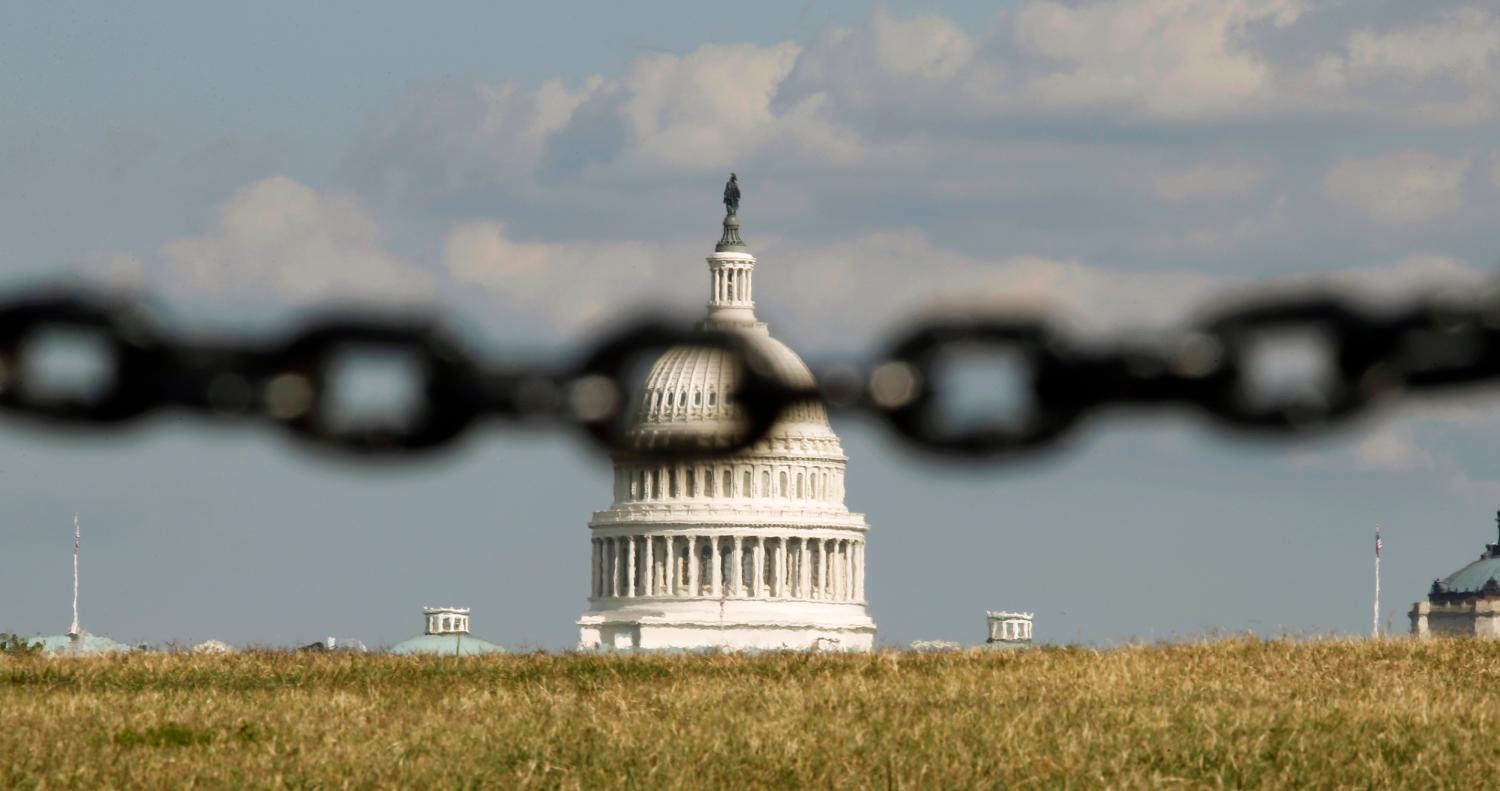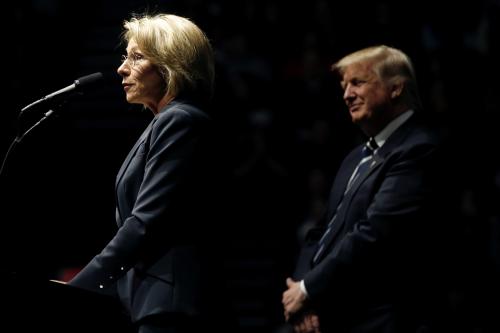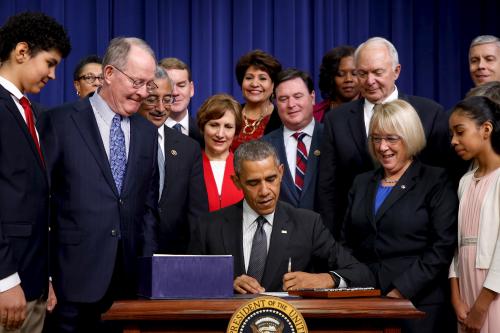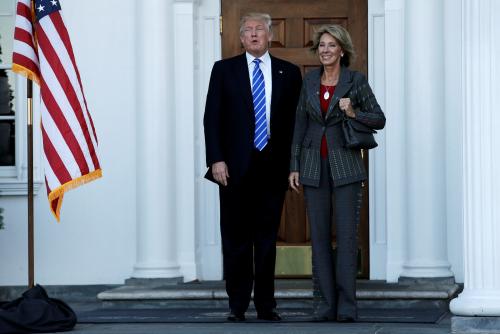When President Obama signed the Every Student Succeeds Act (ESSA) in December 2015, the law was hailed as a bipartisan achievement and a dramatic improvement over the No Child Left Behind Act of 2001 (NCLB). In particular, Republicans and Democrats alike lauded the increase in state autonomy and the simultaneous rollback in the Department of Education’s authority.[1] Does this mean that the longstanding debate over the Department of Education’s role in public education is settled? Not necessarily. Both the existing fault lines within education and current political conditions suggest that the question of how much authority ESSA grants the Department over states remains open—both to interpretation and further legislation. Let me explain.
Partisan disagreements over the law’s implementation surfaced during committee hearings on the Department’s proposed regulations, released May 26. Republicans criticized the Department’s proposed regulations as overreach, arguing that under ESSA, the Department enjoys limited authority over state policy making. Indeed, in his opening remarks to a Senate Health, Education, Labor, and Pensions committee hearing on ESSA implementation, committee chairman Senator Lamar Alexander (R-TN) admonished Secretary of Education John King that “already we’re seeing disturbing evidence that the Department of Education is ignoring the law that the 22 members of this committee worked so hard to craft.”
From the other side of the aisle, Senator Patty Murray (D-WA) provided a counterweight to Sen. Alexander’s reprimand, emphasizing the importance of the Department’s role in holding states accountable for student achievement: “while we were writing this law, we were deliberate on granting the Department the authority to regulate on the law and hold schools and states accountable for education.” In her remarks, she cites a letter from the Leadership Council on Civil and Human Rights which unequivocally argues that ESSA preserves a robust role for the Department of Education: “ESSA is clear: The department has the authority and responsibility to issue regulations and guidance, and to provide guidance and technical assistance for the implementation of the Every Student Succeeds Act (ESSA).”
The contrast between Sen. Alexander and Murray’s viewpoints exposes a central debate over the Department’s proposed regulations and over ESSA implementation more broadly. This right-left split over the proper role of the federal government in education policy is nothing new; Republicans and Democrats have been at odds over the Department of Education’s authority since Carter created the cabinet-level department in 1979. Consider, for example, heated debates along partisan lines over the Clinton administration’s proposal to include “opportunity to learn” standards in the 1994 reauthorization of the Elementary and Secondary Education Act. As the excerpts above indicate, this debate over how the Department should hold states accountable for student achievement remains unresolved.
Paralleling these disagreements among elected officials, since its inception, public support for the Department of Education (and by rough proxy, federal involvement in public education) has been divided. Roughly the same proportion of national survey respondents agreed with the Reagan administration’s position that the Department was “not needed” (39 percent) as those who disagreed (37 percent), while almost a quarter of respondents (24 percent) responded “don’t know.”[2] Almost thirty years later, public perception of the Department remains split. In a September 2015 national survey, 44 percent of respondents viewed the Department favorably, while 50 percent viewed it unfavorably.[3]
Political conditions may also mean that despite bipartisan passage of ESSA, the debate over implementation is far from over. Research suggests that congressional oversight of the executive branch increases under divided government. Thus, there may be reason to expect more scrutiny of the Department’s proposed regulations to implement ESSA than if one or both houses of Congress was controlled by the Democrats. On the other hand, in a new article Bolton, Potter and Thrower find that the Office of Information and Regulatory Affairs (OIRA) may accelerate approval of rules that are “presidential priorities,” although the president’s ability to capitalize on this advantage is hampered when OIRA is understaffed and over-worked. While the Republican-controlled Congress can set the agenda in terms of committee hearings, drawing attention to its concerns with the Department’s proposed regulations, OIRA may face pressure to approve rules promulgated by the Department, currently run by Secretary John King, an Obama appointee.
Finally, evidence suggests that laws passed under divided government are more likely to be amended in subsequent years than those passed under unified government. The logic is that laws passed under divided government are products of political compromise and as such are less coherent and more vulnerable to revision down the line. Passed by a Republican Congress and signed by a Democratic president, ESSA certainly falls into this category.
Ultimately it is hard to say what impact these political conditions will have on the Department’s proposed regulations and on implementation of ESSA more broadly. But at the very least, these conditions are not conducive to swift or decisive policy making. But that may not be a bad thing. Vigorous debate—both across parties, and across branches of government—may help ensure that implementation of ESSA reflects neither a knee-jerk reaction against NCLB and federal authority nor a defense of the NCLB-era status quo pertaining to the Department’s role in public education.
[1] On February 10, 2016, Representative Todd Rokita (R-IN) opened a House Subcommittee on Early Childhood, Elementary and Secondary Education hearing by declaring victory for state and local education leaders: “After years of flawed policies and federal intrusions into the nation’s classrooms, Congress passed the Every Student Succeeds Act based on the principle that responsibility of K-12 education must be returned to state and local leaders.”[1] In a similar tone, the American Federation of Teachers describes ESSA as “a sea change in education policy,” citing the “bold new opportunity for states and districts to move beyond top-down, test-and-sanction-based reforms that have failed to help all kids.”
[2] Phi Delta Kappa. Gallup/PDK Poll of Public Attitudes Toward the Public Schools 1987, Apr, 1987 [survey question]. USGALLUP.87PDK.R22. Gallup Organization [producer]. Cornell University, Ithaca, NY: Roper Center for Public Opinion Research, iPOLL [distributor], accessed Jul-25-2016.
[3] Pew Research Center for the People & the Press. Pew Research Center for the People & the Press Political Survey, Sep, 2015 [survey question]. USPSRA.112315.R13IF1. Princeton Survey Research Associates International [producer]. Cornell University, Ithaca, NY: Roper Center for Public Opinion Research, iPOLL [distributor], accessed Jul-25-2016. The survey results reported here were obtained from searches of the iPOLL Databank and other resources provided by the Roper Center for Public Opinion Research.
The Brookings Institution is committed to quality, independence, and impact.
We are supported by a diverse array of funders. In line with our values and policies, each Brookings publication represents the sole views of its author(s).








